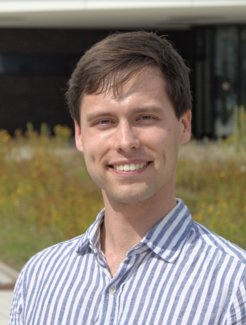Diving deep into quantum nuclear tunnels with a Humboldt Fellowship
George Trenins, a postdoctoral researcher in the Lise Meitner research group Simulations from Ab Initio Approaches: Structure and Dynamics from Quantum Mechanics, has been selected for a Humboldt Research Fellowship.

His work in the SAbIA group focuses on quantum nuclear tunneling in metals. “Many interesting chemical processes that happen on metal surfaces involve the making and breaking of bonds to hydrogen atoms,” George explains. “As the lightest chemical element, hydrogen is especially likely to undergo quantum nuclear tunnelling at room temperature. But at the same time, the interactions with electrons in the metal also modify the extent of the quantum tunneling – through a mechanism known as ‘electronic friction’.”
This phenomenon can significantly change reaction times. An in-depth understanding of how it affects different materials is important not just in principle, but also for applications like hydrogen storage technologies, heterogeneous catalysts and water splitting reactions.
George plans to combine the path-integral formulation of quantum mechanics with a framework for modelling frictional dynamics. This approach would enable researchers to study the tunneling processes from a detailed, fully atomistic perspective.
He joined the SAbIA group, led by Mariana Rossi, at the MPSD in 2023 after spending three years as a postdoctoral researcher at the Institute of Molecular Physical Science, ETH Zurich, Switzerland. George gained his MSci in Natural Sciences and his PhD in Theoretical Chemistry at the University of Cambridge, U.K. Last year, his paper Exact tunneling splittings from symmetrized path integrals was the Editors’ Pick in the Journal of Chemical Physics.












